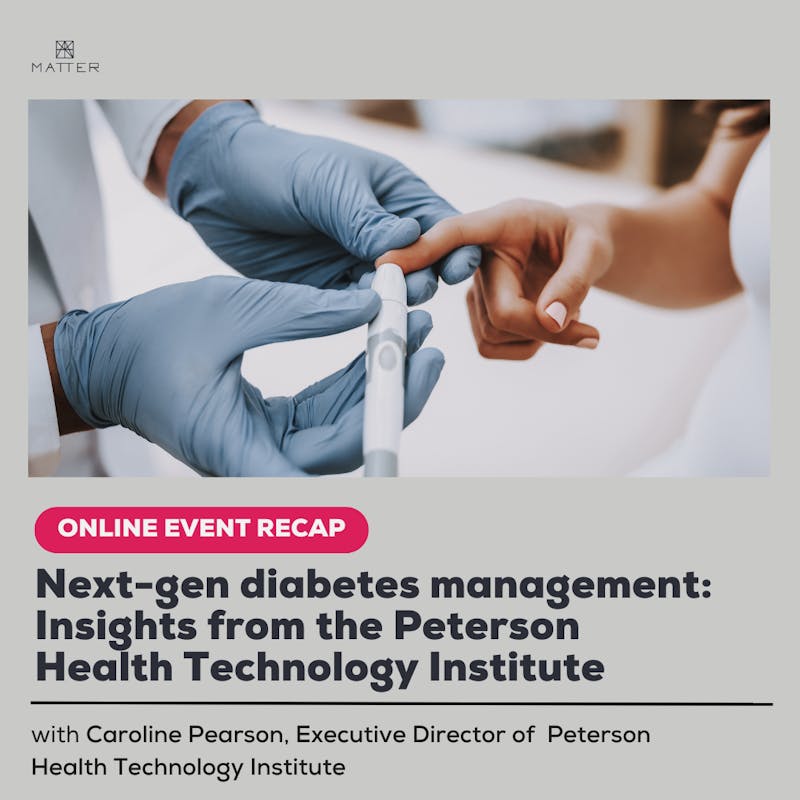Next-gen diabetes management: Insights from the Peterson Health Technology Institute
MATTER hosted a virtual conversation with Caroline Pearson, executive director of the Peterson Health Technology Institute, to discuss the current shortcomings and promising future of diabetes management.
The Peterson Health Technology Institute (PHTI) recently released a report scrutinizing digital diabetes management solutions, sparking controversy within the healthcare industry. The report suggests that rather than reducing expenditures, these digital management solutions are generally adding costs to the healthcare system.
On May 7, PHTI Executive Director Caroline Pearson and MATTER CEO Steven Collens dissected the report’s findings and methodologies, shedding light on its controversial nature. Despite criticisms, the report stands firm, prompting PHTI to explore further assessments in digital hypertension management and mental/behavioral health.
Watch the full discussion below for an in-depth exploration of the report’s implications and PHTI’s upcoming diabetes management initiatives, including a digital hypertension management report and research on virtual care for depression and anxiety.
Read on for key insights gleaned from the conversation.
Insight One: Many digital diabetes solutions fail to achieve clinically significant reductions in Hemoglobin A1C compared to conventional care methods.
Hemoglobin A1C stands as a crucial marker in managing diabetes, closely tied to key health indicators such as cardiovascular risks. According to PHTI’s research, there’s a lack of consistent evidence showing that digital diabetes solutions deliver lasting benefits when compared to traditional care approaches. Furthermore, their findings indicate a lack of evidence supporting digital solutions in enhancing secondary health outcomes or promoting health equity.
Insight Two: It’s imperative to identify optimal windows of opportunity to maximize digital diabetes management effectiveness.
A significant hurdle in leveraging digital diabetes tools is their role in promoting behavioral change, especially when patients have established self-management routines. However, there are opportune moments during patient care transitions, such as initiating insulin therapy, where digital solutions can be instrumental. By utilizing digital tools during these pivotal points, providers can assist patients in developing more effective care routines, potentially leading to improved outcomes.
Insight Three: Gaps in effective digital diabetes management leave opportunities for growth.
PHTI’s research reveals key insights guiding the development of future digital diabetes management solutions. Specifically, the next generation of tools must prioritize achieving clinically significant glycemic control. Additionally, enhancing integration with healthcare providers is vital to ensure that digital tools effectively reach patients who stand to benefit the most.
Do you prefer to catch up on MATTER events via podcast? Listen below.
Interested in attending a MATTER event? Subscribe to our events calendar.
About MATTER
At MATTER, we believe collaboration is the best way to improve healthcare. The MATTER collaborative includes more than 1,000 current and alumni startups from around the world, working together with dozens of hospitals and health systems, universities and industry-leading companies to build the future of healthcare. Together we are accelerating innovation, advancing care and improving lives. For more information, visit matter.health and follow @MATTERhealth.


.png?ixlib=jekyll-1.1.0&w=2400)

